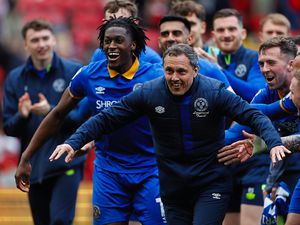Adam Peaty and Freya Anderson write history with mixed medley gold
Lydia Jacoby’s goggles fell off diving into the pool but even if they hadn’t, the speed at which Adam Peaty came flying past her may have knocked them off anyway.
Jacoby has been one of the stories of the Tokyo 2020 so far – the 17-year-old from Alaska, a US state with just one 50-metre pool, who shocked the world to win women’s 100m breaststroke gold – but the first-ever 4x100m mixed medley relay Olympic final will be a race she probably wants to forget.
By contrast, Team GB will always remember it – Peaty, Kathleen Dawson, James Guy, Anna Hopkin and heat competitor Freya Anderson writing their names in the history books as the maiden Olympic mixed medley relay champions, with a dominant world record in the final to boot.
It was a fourth Team GB swimming gold in Tokyo, to match the record haul achieved at London 1908, while Peaty and Guy joined Tom Dean as the first male British swimmers to be double champions at a Games since those same Olympics 113 years ago.
Peaty was a man possessed as he laid down a frankly absurd split of 56.78s, a full 0.1s better than his own 100m breaststroke world record, albeit without needing to react to a starter’s gun.
After Jacoby’s initial goggle malfunction that caused her to swim the second leg with the eyewear round her chin, the 26-year-old from Uttoxeter stormed past her as if powered by an outboard motor. As it turns out, he doesn’t like people being ahead of him.
“It sounds silly but if I see someone ahead of me I just want to go – I see red mist and I’ve got to get you,” he explained.
Not that Peaty is used to trailing. After all, this is a man who is unbeaten over 100m since 2014.
Worryingly for his opponents, even if they are one day able to overhaul him, it appears that being behind only seems to spur him on.
That is one of the unique charms of the 4x100m mixed medley relay, which has been a roaring success at its debut Games – the novelty of seeing male and female swimmers go head-to-head.
Each country is compelled to put two male and two female athletes in its quartet but which strokes are assigned to which gender is entirely up to them.
It’s means men’s and women’s 100m breaststroke champions Jacoby and Peaty are swimming in adjacent lanes, while Hopkin tries to hold off all-conquering American superstar Caeleb Dressel on the anchor freestyle leg.
“It’s pretty cool to say I’ve beaten Caeleb Dressel,” quipped Hopkin after collecting her gold medal. “I didn’t really look at where he was, that would have taken my focus away from what I was doing but it’s pretty cool to have been in the same race as him.
“James [Guy] got me such a great lead that there was no chance Dressel could catch me, so it’s all thanks to these guys that I could do what I needed to do at the end.”
Every member of the foursome had a story to tell, with backstroker Dawson slipping off the wall at the start but composing herself to stay right with the other teams that also led off with a female, while Guy pulled out of the individual 100m butterfly to focus on the relays.
Sacrificing a legitimate solo medal chance ultimately paid dividends, as a sparkling fly split of 50.00s gave Hopkin a lead she never looked likely to relinquish.
It all combined for a new world record time of 3:37.58 – a full 0.83s better than the previous best – and Team GB adding to what has been a stunning Olympics for their swimmers.
Peaty can now call himself a four-time Olympic medallist and in addition to being one of the greatest British sportspeople of all-time, he’s an incredible ambassador for the sport.
“I never thought I’d have four Olympic medals,” he explained after the triumph. “I want to enjoy this moment – British swimming has completely flipped over, completely.
“That’s down to the people back home and out here finding the one percents. We get the plate flying but there’s a whole orchestra of people behind that I want to thank as well.
“I hope this team and the rest of British swimming get the recognition they deserve because it’s been hard.
“We’ve got such amazing talent and hopefully the kids back home who haven’t had access to a pool or have quit, hopefully it gives them the kickstart to secure the next generation.
“There’s no point doing any of this if we’re not inspiring people. That’s what the Olympics is about, right? To do better and chase dreams.”
Peaty has not only chased but captured his dream and Sunday – the final day of swimming action in Tokyo – gives both him and Guy another shot at gold in the men’s 4x100m medley relay.
It’s an event that has been won by the United States at 14 of the 15 Olympics where it’s been contested – the lone exception being Moscow 1980 that they boycotted – but when you’ve become accustomed to making history in the way Peaty has, what’s one more piece?
No one does more to support our Olympic and Paralympic athletes than National Lottery players, who raise around £36 million each week for good causes including elite and grassroots sport. Discover more about how playing The National Lottery supports Team GB’s athletes by visiting www.national-lottery.co.uk/tokyo2020 and get involved by using the hashtags: #TNLAthletes #MakeAmazingHappen





